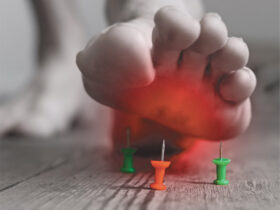Dr. Michael J. Petrocelli, Board Certified in Ankle and Foot Surgeries
 Diabetic neuropathy is a progressive disease that affects nearly 200,000 new patients per year. Roughly, 29 million Americans have diabetes. Many of these cases are undiagnosed, but for those individuals that struggle with the disease, symptoms of diabetic neuropathy can be debilitating.
Diabetic neuropathy is a progressive disease that affects nearly 200,000 new patients per year. Roughly, 29 million Americans have diabetes. Many of these cases are undiagnosed, but for those individuals that struggle with the disease, symptoms of diabetic neuropathy can be debilitating.
People with diabetes have an extremely high storage of glucose; Glucose damages many organs in the body but also has a severely adverse effect on nerves. This nerve damage happens because the small blood vessels, which supply blood and nutrients to the nerves becomes impaired. When the nerves are no longer fed nutrients, they either die, or their signals to the brain are ineffective.
Individuals with diabetes are at a higher risk of developing foot ulcers. These are not just simple wounds that are to be overlooked. When a diabetic person develops these foot ulcers, it can be life threatening.
Understanding the disease state is complex, but in short, having high blood sugar levels, along with low blood and oxygen supply, damages the nerves throughout the body. This damage affects the long peripheral nerves that feed sensations to the legs, feet, and toes from the spinal cord, through communication with the brain. If your condition has progressed, along with nerve damage, you may develop lingering sores on your feet and toes that are resistant to healing.
Diabetic Foot Neuropathy Symptoms
• Numbness
• Tingling
• Burning sensations
• Painful aching
• Joint inflammation
• Joint damage
• Balance issues
• Skin discoloration & texture changes
• Muscle cramps
• Feelings of stiffness
• Non-healing foot & ankle ulcers
Once the peripheral nerves are damaged, there is no cure. Along with medications and drug therapies, there are proven methods to lessen the symptoms of diabetic foot neuropathy.
Foot Ulcers
Because of the nerve damage, the feet will most likely not secrete oils or sweat properly and can develop cracks and deep slits from dry skin. Calluses can also split, and once these issues start to take place, bleeding, infections and non-healing wounds form on the bottom of the foot and toes. The lack of blood supply and the nerve issues, do not allow the wound to heal properly on its own. Along with this disorder, the individual will continue to put pressure on the foot; this rubbing action is similar to wearing a hole in your sock or shoe.
It’s critical to keep your glucose levels regulated.
Diabetic Foot Ulcer Treatment
• Antibiotics
• Grafts
• Hyperbaric oxygen treatments
• Saline debridement
• Surgery
• Therapeutic footwear
• Wound care
People with diabetes are encouraged to do self-
checks on their feet daily. As soon as you notice any redness or wounds, it is imperative to see your podiatrist.
Collier Podiatry
Dr. Michael Petrocelli has been practicing podiatric medicine for well over 20 years. He is an expert in his field and a leader to his peers. Podiatrists treat the entire knee down area of the leg, so if you are experiencing diabetic leg, ankle, or foot wounds, rest assured that Collier Podiatry’s podiatric care is your best option.
Their kind and well-trained staff are ready to answer your questions and concerns and get you back on your feet again. Collier Podiatry is available to answer your questions and make your appointment. Please call them at (239) 775-0019.
Collier Podiatry
239-775-0019
www.collierpodiatry.com
NCH Countryside Commons
1715 Heritage Trail, Suite 204
Naples, FL 34112
Phone: (239) 775-0019
Fax: (239) 775-0219










